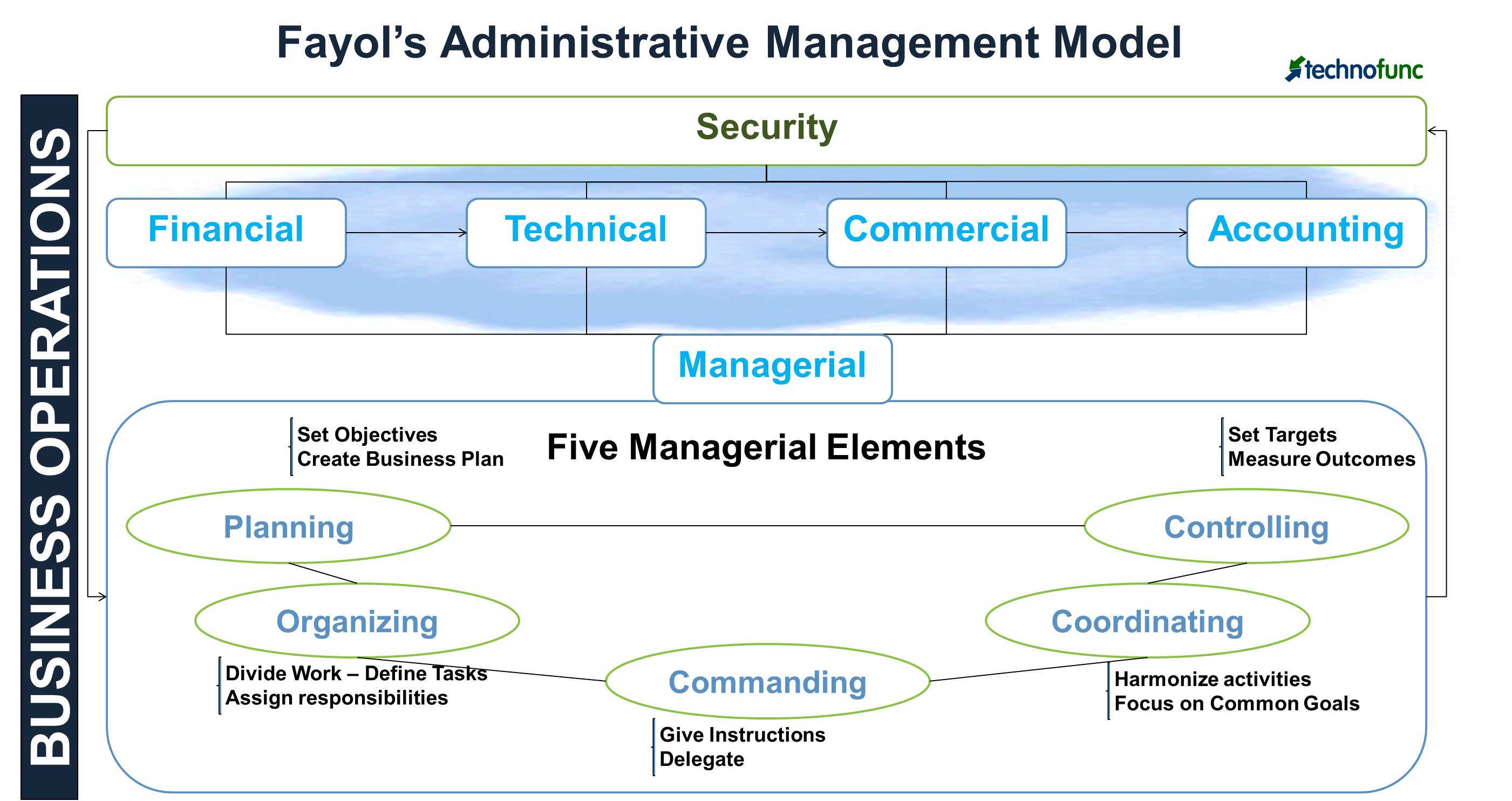- Home
- Business Processes
- Industry Knowledge
- Aerospace Industry
- Automotive Industry
- Banking Domain
- BFSI Industry
- Consumer/ FMCG Industry
- Chemicals Industry
- Engineering & Construction
- Energy Industry
- Education Domain
- Finance Domain
- Hospitality Domain
- Healthcare Industry
- Insurance Domain
- Retail Industry
- Travel and Tourism Domain
- Telecom Industry
- Leadership Skills
- eLearning
- Home
- Leadership
- Leadership & Management
- Administrative Theory by Fayol
Administrative Theory by Fayol
The administrative theory of management is focused on principles that could be used by managers to coordinate the internal activities of organizations. The most prominent of the administrative theorists was Henri Fayol. Fayol observed a work stoppage and judged it to be a management failure. He believed that organizational managerial practices are important for driving predictability and efficiency in organizations.
Fayol’s Administrative Management Theory
The administrative theory of management is focused on principles that could be used by managers to coordinate the internal activities of organizations. The most prominent of the administrative theorists was Henri Fayol. Fayol observed a work stoppage and judged it to be a management failure. He believed that organizational managerial practices are important for driving predictability and efficiency in organizations.
While the proponents of scientific management developed principles that could help the individual workers perform their tasks more efficiently, the administrative theory focused on principles that could be used by managers to coordinate the internal activities of organizations. The most prominent of the administrative theorists was Henri Fayol.
Henri Fayol (1849-1925), was a French industrialist and a prominent European management theorist. Henri Fayol is known as the Father of Management and he developed a general theory of management and also, laid down the 14 principles of Management. Fayol was unknown to American managers and scholars until his most important work, "General and industrial management", was translated into English in 1949. These 14 principles of management are used to manage an organization and are beneficial for prediction, planning, decision-making, organization and process management, control, and coordination.

Administrative Management
Many of the managerial concepts that make the foundation of modern management thought were first articulated by Fayol. Fayol believed that with scientific forecasting and proper methods of management, satisfactory predictable results were sure to follow. The theory falls under the Administrative Management school of thought (as opposed to the Scientific Management School led by Fredrick Taylor).
According to Fayol, the business operations of an organization could be divided into six broad activities.
- Technical: Producing and manufacturing products
- Commercial: Buying, selling and exchange
- Financial: Search for optimal use of capital
- Security: Protecting employees and property
- Accounting: Recording and taking stock of costs, profits, liabilities, maintaining balance sheets and compiling statistics
- Managerial: Planning, organizing, commanding, coordinating and controlling
Fayol’s Five Elements of Management
Fayol studies primarily focused on the last activity which is “Managerial Activity”. He identified five major elements of management that depict the expected behaviors that managers should engage in to achieve the business objectives of the organization effectively. The five elements of management are:
- Planning
- Organizing
- Commanding
- Coordinating
- Controlling

Let us briefly discuss these five elements of management as described by Fayol and relevant for modern enterprises and managers even today.
1. Planning:
Planning is the most important managerial function. It is a future-oriented exercise to creating a business plan, determining the different stages to execute and track the plan and define the technology and resources necessary to implement the plan. Planning is all about identifying in advance what needs to be done, how it will be done, and what are the timelines and responsibilities for execution. It lays down the roadmap of the current organizational state to where the organization wants to be. The outcome of the planning function is logical goals and their timelines. Managers should engage in both short-range and long-range planning.
2. Organizing:
Once a plan of action is designed, managers have the visibility of what is expected and by when. To achieve these milestones, they need to solve for resources and assign them appropriate tasks. They need to focus on providing everything necessary to carry out the plan; including raw materials, machinery and tools, capital, funds, and human resources. They must identify and establish responsibilities for each of the departments or divisions, and specifying organizational relationships.
3. Command:
Managers need to implement the plan by efficiently utilizing the allocated resources. They must understand the strengths/weaknesses of their workforce and the limitations of the resources at hand. Managers must lead and motivate employees to achieve the goals of the organization. Employees may require the proper allocation of resources and an effective support system and supervision. Directing requires exceptional interpersonal skills and the ability to motivate and inspire people while balancing the staff and production needs.
4. Coordination:
Organizations are interdependent systems and need coordination among different departments to stay in sync and targeted on the plan. Manager’s biggest responsibility is to "harmonize" all required activities across different functions to facilitate and ensure organizational success as per the agreed plan. Managers need good Communication Skills to ensure that the coordinating mechanism is working effectively. Managers are needed to synchronize the elements of the organization and must take into account the delegation of authority and responsibility and span of control within units.
5. Control:
The final element of management as described by Fayol involves the comparison of the activities of the personnel to the plan of action. It is the control and evaluation component of management. Control function ensures that tasks have been completed with required quality in all areas and helps to detect deviations if any from the organization's plan. This ensures quality performance with regard to business objectives and satisfactory results while maintaining an orderly and problem-free environment. Controlling includes information management, measurement of performance, and the institution of corrective actions.
Relevance in the modern workplace
Fayol believed that managerial practices were the key component to predictability and efficiency in organizations. Fayol’s five management functions are clearly similar to modern management functions - planning, organizing, staffing, and controlling. Fayol's concept of management forms the cornerstone of contemporary management theory. Many of Fayol's practices are still alive in today's workplace. These elements can be found in modern organizations in several ways: as for accepted practices in some industries, as revamped versions of the original principles or elements, or as remnants of the organization's history to which alternative practices and philosophies are being offered. The new manager in the digital age must acquire the latest leadership skills and management skills to succeed in today’s competitive world.
Suggested Reading and Resources
Related Links
Creation Date Sunday, 23 August 2020
Hits 110415
You May Also Like
-
Role theory is a concept in sociology and the role theory of leadership borrows these concepts to explain how people adapt to specific organizational and leadership roles. How the leaders and followers in an organizational context define their own roles, define the roles of others, how people act in their roles and how people expect people to act in their roles within the organization.
-
The cognitive resource theory states the influence of the leader's resources on his or her reaction to stress. The cognitive resources of a leader are experience, intelligence, competence, and task-relevant knowledge. Stress is common in resource managing situations, and this cognitive theory emphasizes how intelligence and experience are each best under different stress situations. This theory is the reconceptualization of the Fiedler model.
-
Normative leadership theories are built on moral principles and tell leaders how they ought to act. Victor Vroom formulated the normative model of leadership that specifically address leader behavior explicitly built on moral principles or norms. Normative leadership theories tell leaders how they should act to raise the moral performance inside the working group and manage their different responsibilities.
-
Transformational Theories of Leadership
Transformational leadership theories focus on the leadership approach where the leader encourages, inspires employees to innovate and create positive and valuable organizational change. A transformational leader works towards “transforming” the culture to one that cultivates trust, mutual admiration, loyalty, and respect with the end goal of developing followers into leaders. Transformational leaders are known to be visionary, inspiring, daring, risk-takers, and thoughtful.
-
The skills approach to leadership suggests that certain skills are important for effective leadership. Skills are what leaders can learn and develop, whereas traits are innate characteristics. The main skills needed for leadership, according to one such theory, are technical, human, and conceptual.
-
Trait theories of leadership identify the specific personality traits that distinguish leaders from non-leaders. The trait model of leadership is based on the traits or characteristics of leaders that make them successful in their leading role. These theories use heritable attributes to predict leadership effectiveness.
-
The Valence Model of Leadership
The valence model of emergent leadership is based on a group-development sequence. As per the valence model, the process of emergent leadership passes through three distinct stages; Orientation, Conflict, and Emergence. Group members willingly start following and obeying the leader who has passed the "emergence threshold."
-
Situational Theories of Leadership
The situational theories of leadership assume that the most effective style of leadership depends from situation to situation. Situational leadership is a leadership style in which the leader must adjust to match the development needs of the followers. They must adapt varying behaviors to strike the right balance between task & relationship based on different levels of maturity of followers and also as followers develop and cultivate their skills.
-
The Vroom-Yetton model is designed to optimize for the current situation the leadership style for best decision-making. Its a decision model formulated with contribution from Arthur Jago on how to make group decisions. The leader must gather information from the team prior to making the decision and involves more people in the decision process.
-
The two-factor theory also known as Herzberg's motivation-hygiene theory and dual-factor theory. This motivator-hygiene theory states that certain factors cause job satisfaction whereas certain separate factors cause dissatisfaction in the workplace. An organization can adjust these factors to influence motivation. These factors are respectively termed as motivators and hygiene factors.
Explore Our Free Training Articles or
Sign Up to Start With Our eLearning Courses

About Us
Learning
© 2023 TechnoFunc, All Rights Reserved











"Everyone needs some concepts of management; in the home, in affairs of state, the need for managerial ability is in keeping with the importance of the undertaking, and for individual people, the need is everywhere in greater accordance with the position occupied".